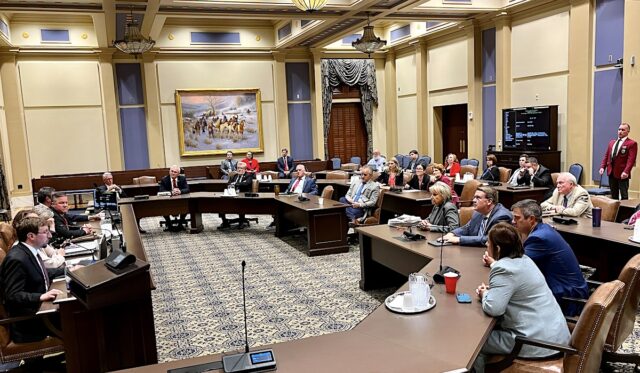

One day after Gov. Kevin Stitt vetoed 20 Senate bills and threatened to continue axing measures from the Legislature’s upper chamber if his proposed education package compromise was not passed to his desk, the Senate Rules Committee convened around 9:40 p.m. Thursday and voted against confirming a pair of Stitt’s Cabinet secretaries.
Senators swiftly rejected the nominations of Chad Mariska, Stitt’s secretary of commerce whom he first nominated in October, and Kevin Corbett, the CEO of the Oklahoma Health Care Authority who has also served as Stitt’s secretary of health and mental health.
Both nominations failed 0-19.
Prior to the committee meeting, Senate President Pro Tempore Greg Treat (R-OKC) told media that his GOP Caucus has had a series of concerns about Corbett already.
Asked to elaborate, Treat referenced the state’s health information exchange rollout, controversial conversations about how the Health Care Authority might spend $600 million in FMAP carryover funds, and “some interaction with other agencies that fall under the purview of that cabinet secretary.”
“There had been frustration building in my caucus for a while on that,” Treat said, before referencing Mariska’s role working with the Department of Commerce on business recruitment efforts. “And there is frustration that we cannot land economic development projects, so we need to get the attention of Commerce.”
Regarding the FMAP money at the Health Care Authority, the Legislature passed a bill to retain authority over $600 million, although discussions involving the money actually involved the use of up to $760 million.
NonDoc obtained a document from March outlining potential uses of the funds, including at least $450 million in proposed new endowments and other projects:
- A $190 million endowment “to stimulate more medical school spaces at OU and OSU for family doctors” and “to support more community medical residencies in rural Oklahoma” and “to help forgive more medical school debt to draw family doctors to rural Oklahoma.”
- A pair of $25 million proposals for the Echo Telehealth Network and the creation of a “regional telemedicine center.”
- A $210 million endowment to fund nurses, public health experts and/or health educators in all rural counties of Oklahoma.
- A $50 million endowment “to stimulate innovative and cooperative local efforts at rural health care.”
- A $150 million investment to fund a “global port authority” aimed at stimulating “international trade for Oklahoma, particularly for Oklahoma rural businesses and agricultural products and services.”
- A $25 million investment to “establish a Center for Food as Medicine to focus on the intersection of human nutrition and food production, processing and food safety.”
OHCA officials say the document “is not a product of the Oklahoma Health Care Authority,” according to communications director Christina Foss.
Instead, an “Ad Hoc Committee” separate from the Health Care Authority‘s board has been discussing the projects as a way to “help change the direction of rural health care in Oklahoma.” Numerous people aware of the discussions have told NonDoc that OHCA Board Chairman Marc Nuttle has been heavily involved in developing the proposals.
The governor’s Cabinet includes a series of designated secretaries who are assigned as liaisons to various agencies, boards and commissions. Because Stitt was sworn into a new term of office in January, his Cabinet secretaries face the need to be reconfirmed by the State Senate before the Legislature adjourns in May.
Stitt recently rearranged the proverbial human accoutrements in his Cabinet on April 11. State law caps the governor’s number of secretaries at 15, although their specific titles and assignments can be adjusted at his discretion.

Senate moves new versions of education proposals
Treat and the Senate Rules Committee took their action to reject Corbett and Mariska late Thursday evening after a 24-hour period of wild political theater and drama regarding a proposed education funding and reform package.
Around 4 p.m., the Senate returned from a lengthy caucus and recess to unveil and advance five new bills constituting the latest proposal in the year’s highly contentious education negotiations.
The new Senate plan would direct $500 million through the state per-pupil equalization formula, with about $350 million dedicated to an across-the-board raise for all teachers between $4,000 and $8,000 based upon longevity. An additional $150 million or so would be sent to districts through the education formula, which would also be modified to increase funding weights regarding bus transportation and economic disadvantaged students.
Perhaps most notably — unlike prior iterations proposed by the House, Senate and governor — the $500 million for teacher pay and school funding is “untethered” to the proposal for new refundable tax credits for private school and homeschool families.
“I am proud that this body advanced both measures without them being tied together. We removed the tethering together that wasn’t necessary. We were threatened a few times throughout this process or cajoled and [told] we couldn’t do it in the negotiations,” Treat said. “We delivered on school choice, and we hope our counterparts across the way will as well. We delivered on up to an $8,000 pay raise for teachers. This body makes me proud every day to be the leader of it.”
The five bills filled with new Senate language on Thursday were:
- HB 2672, which would provide school funding through the state funding formula for a teacher raise and other district operations;
- HB 1934, which would create a tiered school choice refundable tax credit for parents to use on private or homeschool options for their kids;
- HB 2180, which would provide up to eight weeks of paid maternity leave for teachers;
- HB 2679, which would create a pilot program to improve literacy rates across the state;
- HB 1936, which would create a teacher merit pay system and teacher mentor program.
Treat said he hopes the House will consider all of the bills sent over by the Senate today.
“The speaker told me this week, ‘Send me a stand-alone school choice bill.’ The governor said, ‘Send me a stand-alone school choice bill,'” Treat said. “They told me, ‘Send us a school-choice bill that is untethered if you can do it.'”
(Correction: This article was updated at 10:55 p.m. Thursday, April 27, to correct an element of time.)




















